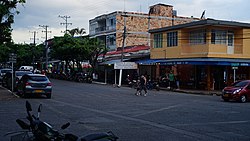|
Cumaral
Cumaral is a town and municipality in the Colombian department of Meta. NameThe name of the municipality comes from the large number of Cumare palms, which were abundant in the early years of its creation.[3] HistoryCumaral was founded in 1901 at a site known as "Laguna Brava" or "Laguna del pueblo" due to an epidemic of yellow fever. Inhabitants of the area were relocated to cumare palm plantations at a site called "Tierra alta" in 1917. Initially, it was known by the name "Boca de monte".[4] The early history of Cumaral was first chronicled by Father Fray Agustín Gómez, the Parish Priest of San Juan de Arama, in a report to Father Fray Clemente Forero, the commissioner of the Llanero reductions, dated October 15, 1750. Father Gómez, after mentioning several tribes including the Camoas of San Martín, referred to the indigenous people who had long lived inland from the original town of Cumaral, noting that it had ceased to exist. This suggests that the first settlement of area near modern Cumaral had vanished before the year 1750.[5] Modern Cumaral's inception dates back to 1917, located six kilometers north of Laguna del Pueblo, near the Guacavía River. This new settlement was established on land generously donated by General Avelino Rosas. Originally named Boca de Monte, the settlement was intended to mark the end of the dense jungle covering the foothills from Villavicencio to Restrepo, and the beginning of the savanna. Key figures in the founding of Boca de Monte were Manuel Saavedra Hernández, Eustorgio Pinzón Machado, Faustino Pulido Rojas, Próspero A. Peña, Jorge Varela, José Genay, David Hernández, and Oliverio Castro. Political-Administrative DivisionIn addition to its municipal seat. Cumaral has jurisdiction over the following populated centers: Guacavía Presentado San Nicolás Veracruz GeographyCumaral has a typical landscape of the Llanero foothills, featuring a flat topography with formations of undulations and estuaries.[4] Climate
References
|
||||||||||||||||||||||||||||||||||||||||||||||||||||||||||||||||||||||||||||||||||||||||||||||||||||||||||||||||||||||||||||||||||||||||||||||||||||||||||||||||||||||||||||||||||||||||||||||||||



